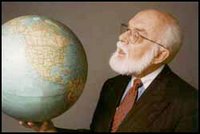My own position probably appears near the extreme of disbelief. I do understand why people who cannot even consider psychic phenomena, or homeopathy, or Near Death Experiences can appear just as rigid and dogmatic as the apparently gullible people
 they oppose, and I guess I don’t feel quite so certain as many of them that nothing ‘strange’ ever really happens. Still, I would far prefer a conversation with Penn and Teller, or James Randi or even Martin Gardner than with someone who claims psychic powers of any kind.
they oppose, and I guess I don’t feel quite so certain as many of them that nothing ‘strange’ ever really happens. Still, I would far prefer a conversation with Penn and Teller, or James Randi or even Martin Gardner than with someone who claims psychic powers of any kind.After all, magicians and actors have explored how to make humans experience or imagine things that have not actually occurred in their ‘real life’ situation – so they seem perfectly qualified for sceptical research and testing.
Martin Gardner may have some attitudes I don’t agree with, but his columns of magic and mathematics in Scientific American kept me enthralled in my youth, fascinated by (say) flexagons or the concept of a googol (yup, the founders spelt it wrong...).

Randi may seem a bit bumptious, but I tend to agree with his analysis of most psychic activities. If I leave open a small window of opportunity for ‘the unexplained’ it does not come from a secret yearning that ‘strange powers’ prove true, but merely from a sense of fairness.
So, in the Maybe Logic Forum I chat to people who might well have some investment in magick, astrology, kabbalistic numerology, unusual healing systems, etc – and try (and often fail) to avoid angering them with my blunt, childlike questions…"how would that work?"
I then appear like one of those hard-line sceptics for whom no proof of ‘supernatural events’ would suffice.
For me it mostly seems like a matter of definition – just as ‘UFO’ originally stood for something Unknown flying, and turned into the shorthand for ‘alien spaceship’ – so I have little trouble hearing about things I can’t explain, and I feel little need to try to find an explanation – especially a glib one. I’ll stick with ‘unknown’ and ‘unexplained’ and 'outside my own experience' without adding a woo-woo of significance to those phrases.

I may not agree with Martin Gardner's critique of (say) General Semantics, and I may not feel as adamantly materialistic as the PSICOP gang, but my sympathies still lie with those who suspect that the bulk of ‘mysteries’ don’t seem very mysterious, really, to a sharp brain and an experienced eye.
William James seems like a role-model for feeling intrigued by the possibilities, while remaining sceptical of the improbable. Much of the dispute can get resolved if we perceive that the placebo effect may explain (say) homeopathy, but that doesn’t mean we should dismiss it out of hand – indeed, anything that makes people feel better deserves study. Check out Stanley Krippner’s comments here
The amazing thing is that there is a history of sleight of hand in shamanism, and sometimes the sleight of hand is used for very benign purposesIn fact, my fascination with the imagination, the placebo, and the search for anything effective, etc led me to NLP and General Semantics and other things that Gardner might well dismiss. In a world where many people and most media prefer the 'exciting' interpretation to the dull one I understand some people's urge to over-compensate the other way. For all the Crop Circle books I can only find one Round in Circles: Poltergeists, Pranksters, and the Secret History of the Cropwatchers.
In honour of fellow sceptics and secularists, I have added a link to Chris Hughes’ blog H'edification for the H'iggerant
No comments:
Post a Comment